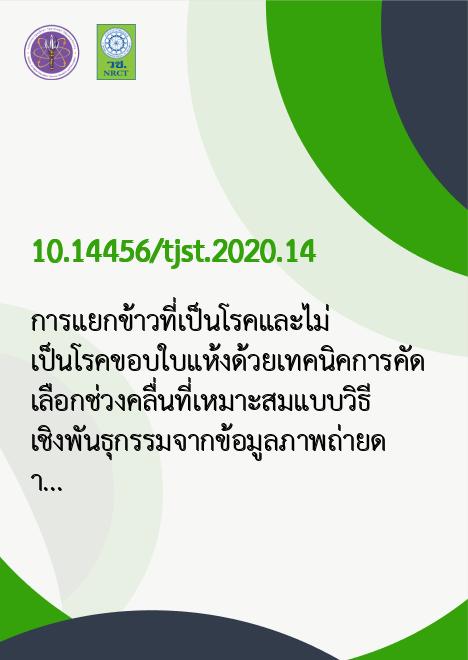
|
การแยกข้าวที่เป็นโรคและไม่เป็นโรคขอบใบแห้งด้วยเทคนิคการคัดเลือกช่วงคลื่นที่เหมาะสมแบบวิธีเชิงพันธุกรรมจากข้อมูลภาพถ่ายดาวเทียมสำรวจทรัพยากรธรรมชาติ EO-1 Hyperion : กรณีศึกษา ข้าวเจ้าพันธุ์ กข 41 ณ ตำบลนางลือ-ท่าชัย อำเภอเมือง จังหวัดชัยนาท |
|---|---|
| รหัสดีโอไอ | |
| Creator | ปฏิวิชช์ สาระพิน |
| Title | การแยกข้าวที่เป็นโรคและไม่เป็นโรคขอบใบแห้งด้วยเทคนิคการคัดเลือกช่วงคลื่นที่เหมาะสมแบบวิธีเชิงพันธุกรรมจากข้อมูลภาพถ่ายดาวเทียมสำรวจทรัพยากรธรรมชาติ EO-1 Hyperion : กรณีศึกษา ข้าวเจ้าพันธุ์ กข 41 ณ ตำบลนางลือ-ท่าชัย อำเภอเมือง จังหวัดชัยนาท |
| Contributor | ชัยโชค ไวภาษา, ธีรภัทร เลิศปฏิภานพงษ์ |
| Publisher | Thammasat University |
| Publication Year | 2563 |
| Journal Title | Thai Journal of Science and Technology |
| Journal Vol. | 9 |
| Journal No. | 1 |
| Page no. | 169-179 |
| Keyword | RD41 rice, bacterial leaf blight disease, hyperspectral remote sensing, Nang Lue-Tha Chai, Chai Nat, EO-1 Hyperion |
| URL Website | https://www.tci-thaijo.org/ |
| Website title | THAIJO |
| ISSN | 2286-7333 |
| Abstract | Bacterial leaf blight disease in rice is rated as one of the main reasons affecting on the quantity and quality reduction of rice cultivation. Therefore, monitoring and tracking of agricultural disease areas are essentially for modern agriculture. According to this, remote sensing is adopted as an important tool for rice disease management. However, there is a few research conducted on remote sensing for rice disease management and validation process required for disease classification with proper spectral resolution. The aim of this study is to investigate the performance of genetic algorithms coupled with the spectral angle mapper (SAM) to identify a meaningful subset of wavelength selective to classify the RD41 rice with and without bacterial leaf blight disease from hyperspectral image (EO-1 Hyperion imagery). The results show that the GA base band selectors improve the overall accuracy for the recognition of RD41 rice bacterial leaf blight disease from 82.6 to 89.3 percent as compared to the SAM classification using all bands. However, this approach can be used to reduce the effects on bacterial leaf blight disease and is useful in the management of the Thai rice industry in the future. |